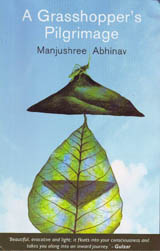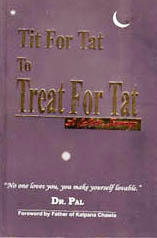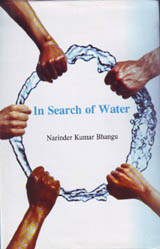|
SHORT TAKES
Search for spiritual solace
Randeep Wadehra
A Grasshopper’s Pilgrimage
by Manjushree Abhinav.
Rupa.
Pages 173. Rs 150.
 WHY
‘grasshopper’. This question hops onto one’s mindscape the moment
one reads the title. It is one of the most unromantic and non-spiritual
species belonging to the Orthoptera genus. Its cousin, the cricket,
would have been better perhaps — at least it generates a modicum of
music at night, lending a spiritual halo to tranquil nights. But then,
while the critic carps, the deed has been done already; so let’s move
on to the narrative. Pretty Gopika, this novel’s protagonist,
desperately searches for love and spiritual fulfillment. In the process
she visits various temples and spiritual centres, gets infatuated with
Ramesh — a spiritual guru, and encounters men ranging from the fat
Gurpreet to debonair Fareed — with a posse of firangs thrown in. If
you are anticipating a spicy saga of sex and spiritualism, banish the
thought. The novel hardly delves into spiritualism; there are
"spiritual" persons like the weighing machinewalla who
moonlights as Baba on a mosque’s footsteps in Mumbai — with a motley
crowd of desi and firang seekers surrounding him; or the mendicant who
chants "Arunachala Shiva" while begging for alms on
Tiruvannamalai’s mountainous roads. Gopika experiments with Vipassana
too. In the name of love or sex there are platonic/pseudo-romantic
encounters with a bunch of ragtag drug-addicts-on-the-mend and the
faceless Gurpreet and other caricatures. Only the debonair Fareed gets
to bed Gopika. Her spiritual quest climaxes with her return to the
mystical Mount Tiruvannamalai. WHY
‘grasshopper’. This question hops onto one’s mindscape the moment
one reads the title. It is one of the most unromantic and non-spiritual
species belonging to the Orthoptera genus. Its cousin, the cricket,
would have been better perhaps — at least it generates a modicum of
music at night, lending a spiritual halo to tranquil nights. But then,
while the critic carps, the deed has been done already; so let’s move
on to the narrative. Pretty Gopika, this novel’s protagonist,
desperately searches for love and spiritual fulfillment. In the process
she visits various temples and spiritual centres, gets infatuated with
Ramesh — a spiritual guru, and encounters men ranging from the fat
Gurpreet to debonair Fareed — with a posse of firangs thrown in. If
you are anticipating a spicy saga of sex and spiritualism, banish the
thought. The novel hardly delves into spiritualism; there are
"spiritual" persons like the weighing machinewalla who
moonlights as Baba on a mosque’s footsteps in Mumbai — with a motley
crowd of desi and firang seekers surrounding him; or the mendicant who
chants "Arunachala Shiva" while begging for alms on
Tiruvannamalai’s mountainous roads. Gopika experiments with Vipassana
too. In the name of love or sex there are platonic/pseudo-romantic
encounters with a bunch of ragtag drug-addicts-on-the-mend and the
faceless Gurpreet and other caricatures. Only the debonair Fareed gets
to bed Gopika. Her spiritual quest climaxes with her return to the
mystical Mount Tiruvannamalai.
Good for a breezy
once-over.
Tit for Tat to Treat
for Tat
by Dr Pal.
Life Care Foundation.
Pages 194. Rs 250.
 The
problem with inspirational literature is that often it gets repetitive
— something akin to books on religion. Yet, different self-improvement
gurus keep striving for distinctiveness by coining high-sounding catch
phrases. This is what Pal has done too; but with a difference. He has
come up with methods like IC Therapy whereby a person can improve his
attitude by communicating with himself. Interestingly, he reverses the
relationship between one’s mental state and physical posture by
arguing that by changing one’s physical stance one can positively
affect one’s emotional state. Similarly, through ‘Human Engineering’
it is possible to generate positive vibes among people around you — be
they your subordinates, colleagues, kin or friends. The
problem with inspirational literature is that often it gets repetitive
— something akin to books on religion. Yet, different self-improvement
gurus keep striving for distinctiveness by coining high-sounding catch
phrases. This is what Pal has done too; but with a difference. He has
come up with methods like IC Therapy whereby a person can improve his
attitude by communicating with himself. Interestingly, he reverses the
relationship between one’s mental state and physical posture by
arguing that by changing one’s physical stance one can positively
affect one’s emotional state. Similarly, through ‘Human Engineering’
it is possible to generate positive vibes among people around you — be
they your subordinates, colleagues, kin or friends.
The entire book is
structured as a dialogue between the author and his alter ego, "Mr
Gandhi". The book’s contents, presented in anecdotal and easy
conversational style, might appeal to those interested in tips on
self-improvement.
In Search Of Water
by Narinder Kumar Bhangu.
Unistar.
Pages 79. Rs 195.
 Water
resources are limited on this planet. With the phenomenal increase in
world population this life-sustaining source is getting scarcer by the
day. Currently, about a billion people do not have access to safe
drinking water, more than two billion people have inadequate access to
water for sanitation and waste disposal, half of the world’s hospital
beds are occupied by patients suffering from waterborne diseases —
and, not all patients can afford hospital beds. As if these statistics
aren’t scary enough, various experts point out to the irreparable
destruction of bio-diversity, imminent global water-warfare and fall in
food production, among other horrific things. Water
resources are limited on this planet. With the phenomenal increase in
world population this life-sustaining source is getting scarcer by the
day. Currently, about a billion people do not have access to safe
drinking water, more than two billion people have inadequate access to
water for sanitation and waste disposal, half of the world’s hospital
beds are occupied by patients suffering from waterborne diseases —
and, not all patients can afford hospital beds. As if these statistics
aren’t scary enough, various experts point out to the irreparable
destruction of bio-diversity, imminent global water-warfare and fall in
food production, among other horrific things.
One recalls such
oft-repeated facts while going through this book, which has attempted a
scenario circa 2065. However, the author is clearly not comfortable with
the language.
In case one must write in
English then at least the relevant skills must be upgraded to the
required level. Good syntax, reader-friendly language and apt usage of
phrases would’ve certainly made this book very useful.
|